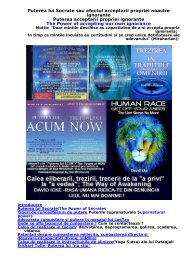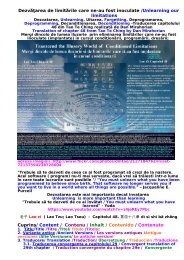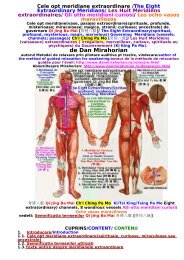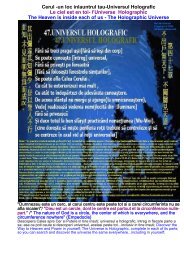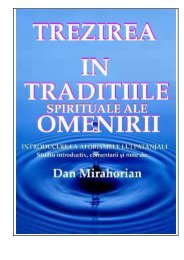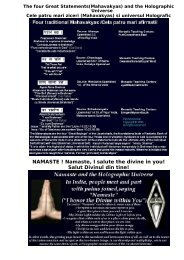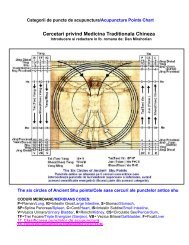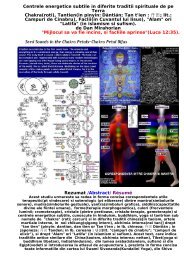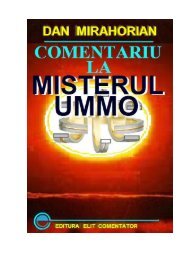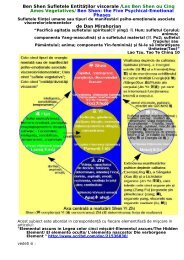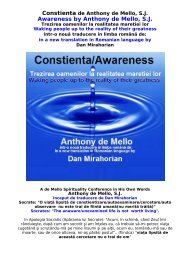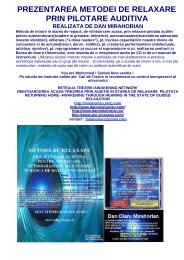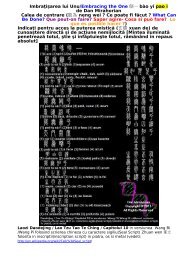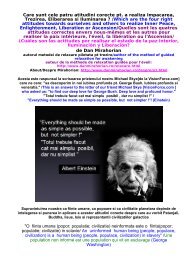äºè¡ææ¯å è¡ ? - Mirahorian
äºè¡ææ¯å è¡ ? - Mirahorian
äºè¡ææ¯å è¡ ? - Mirahorian
You also want an ePaper? Increase the reach of your titles
YUMPU automatically turns print PDFs into web optimized ePapers that Google loves.
highest/utmost point; extreme; earth's pole; reach the end; attain; exhaust". In analogy<br />
with the figurative meanings of English pole, Chinese ji 極 "ridgepole" can mean<br />
"geographical pole; direction" (e.g., siji 四 極 "four corners of the earth; world's end"),<br />
"magnetic pole" (Beiji 北 極 "North Pole" or yinji 陰 極 "negative pole; anode"), or "celestial<br />
pole" (baji 八 極 "farthest points of the universe; remotest place"); Common English<br />
translations of the cosmological Wuji are "Ultimateless" (Fung and Bodde 1953, Robinet<br />
2008) or "Limitless" (Zhang and Ryden 2002), but other versions are "the ultimate of<br />
Nothingness" (Chang 1963), "that which has no Pole" (Needham and Ronan 1978), or "Non-<br />
Polar" (Adler 1999). Lao Tzu in Tao Te Ching/Dao de jing uses the term Wuji in the<br />
context about returning to one's original/primordial undifferentiated nature: ""Know the<br />
White (Yang, outside world, the symbol of death in Chinese culture), but keep yourself<br />
grounded in black (Yin, inner reality, the symbol of life) and you will be a model for all that<br />
it is in the universe (under the heaven). By being a model for all under heaven, eternal<br />
integrity will never fail. If your eternal integrity will never fail, you will return to the status of<br />
infinite (undifferentiated state, without end; immortal)"". (28, tr. <strong>Mirahorian</strong>, 1990);<br />
Zhuangzi(ca. 3 century BCE) refers four times to wuji as "limitless; infinity; boundless " The<br />
text also uses the related word wuqiong 無 窮 "infinite; endless; inexhaustible" 25 times.<br />
Xunzi (ca. 3rd century BCE) uses wuji "boundless" three times. One context describing a<br />
legendary horse parallels it with wuqiong "inexhaustible". "Qiji could cover 1,000 li in a<br />
single day, but if a worn-out nag takes the journey in ten stages, then it, too, can cover the<br />
distance. Are you going to try to exhaust the inexhaustible and pursue the boundless If<br />
you do, then though you break your bones and wear out your flesh in the attempt, in the<br />
end it will be impossible to reach your goal. (2, tr. Knoblock 1988)<br />
太 一 tai4 yi1 t’ai yi t'ai i R: sinonim pt Tao; divinitate antica; Marele Unu; forta<br />
universala; marea mutatie; Dumnezeu;Tao; Unitatea Suprema; Taiyi Zhenren (Chinese: 太 乙<br />
真 人 ; Pinyin: Tàiyǐ Zhēnrén) format din Taiyi (lit. "a doua ramura Celesta) inseamna<br />
"primordial unitatea primordiala a yin si yang" iar Zhen ren 真 人 (lit. " fiinta umana<br />
adevarata") este un termen taoist pt. "Fiinta Desavarsita/Perfecta". E: the Great One; the<br />
supreme one; The Great Change, Great Unity, the first of the celestial spirits, Spirit of the<br />
Pole Star; "way of the supreme one", the power to cure diseases, the chief diety; the<br />
beginning of numbers; Supreme Movement; opening and closing of the sky door and the<br />
actions of Supreme One (T’ai Yi); Taiyi Zhenren (Chinese: 太 乙 真 人 ; Pinyin: Tàiyǐ Zhēnrén)<br />
from Tai yi (lit. "great 2nd Celestial stem) means "primordial unity of yin and yang" and<br />
Zhenren (lit. "true person") is a Taoist term for "Perfected Person". F: "grand un"; Suprême<br />
Un; le Faîte Suprême; force universelle; "grande mutation" "Tout est donc à la fois spontané<br />
(ziran, 自 然 ) et nécessaire. Une force universelle, appelée taiyi, "grand un" ( 太 一 ), ou qi,<br />
"souffle" , anime chaque phénomène". [Guo Xiang (Kuo Hsiang, 郭 象 ) ou Guo Zixuan ( 郭 子<br />
玄 ) est un philosophe taoïste (vers 252 - 312), éditeur et glosateur du Zhuangzi]<br />
Lieh Tzu (the fifth century B.C.): “In the beginning there was Chaos [hun tun]. It was a<br />
mingled potentiality of Form [hsing], Pneuma [ch’i], and Substance [chih]. A Great Change<br />
[t’ai i] took place in it, and there was a Great Starting [t’ai ch’u] which is the beginning of<br />
Form. The Great Starting evolved a Great Beginning [t’ai shih], which is the inception of<br />
Pneuma. The Great Beginning was followed by the Great Blank [t’ai su], which is the first<br />
formation of Substance. Substance, Pneuma, and Form being all evolved out of the<br />
primordial chaotic mass, this material world as it lies before us came into existence.” And<br />
that which made it possible for Chaos to evolve was the Solitary Indeterminate (i tu or the<br />
tao), which is not created, but is able to create everlastingly. And being both Solitary and<br />
Indeterminate it tells us nothing determinate about itself.<br />
"Le Vrai Classique du Vide Parfait" de Liezi (Lie Tseu) "Distinction Céleste" et "Genèse<br />
des Mondes" (Chapitres I et III ): "...C'est pourquoi je dis : Il y eut une Grande Mutation (Tai<br />
Yi), une<br />
Grande Origine (tai chou), un Grand Commencement (tai che), une Grande Création<br />
Originelle.<br />
La Mutation est l'état dans lequel la Force ne se manifeste pas encore. La Grande Origine



